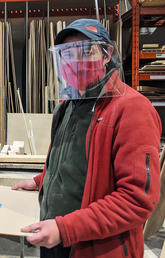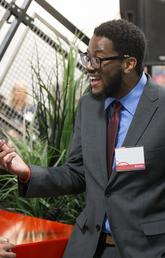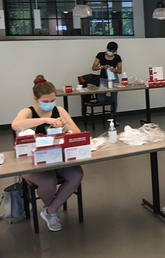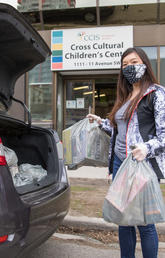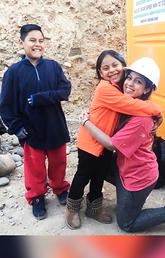Dr. Zaari volunteering at the Royal White Elephant Gardens in Yangon, Myanmar. He is currently coordinating a fundraiser to support the Elephant Garden in developing welfare-friendly living habitats for these elephants.
April 19, 2021
Summer stint as volunteer veterinarian in Morocco left lasting impression
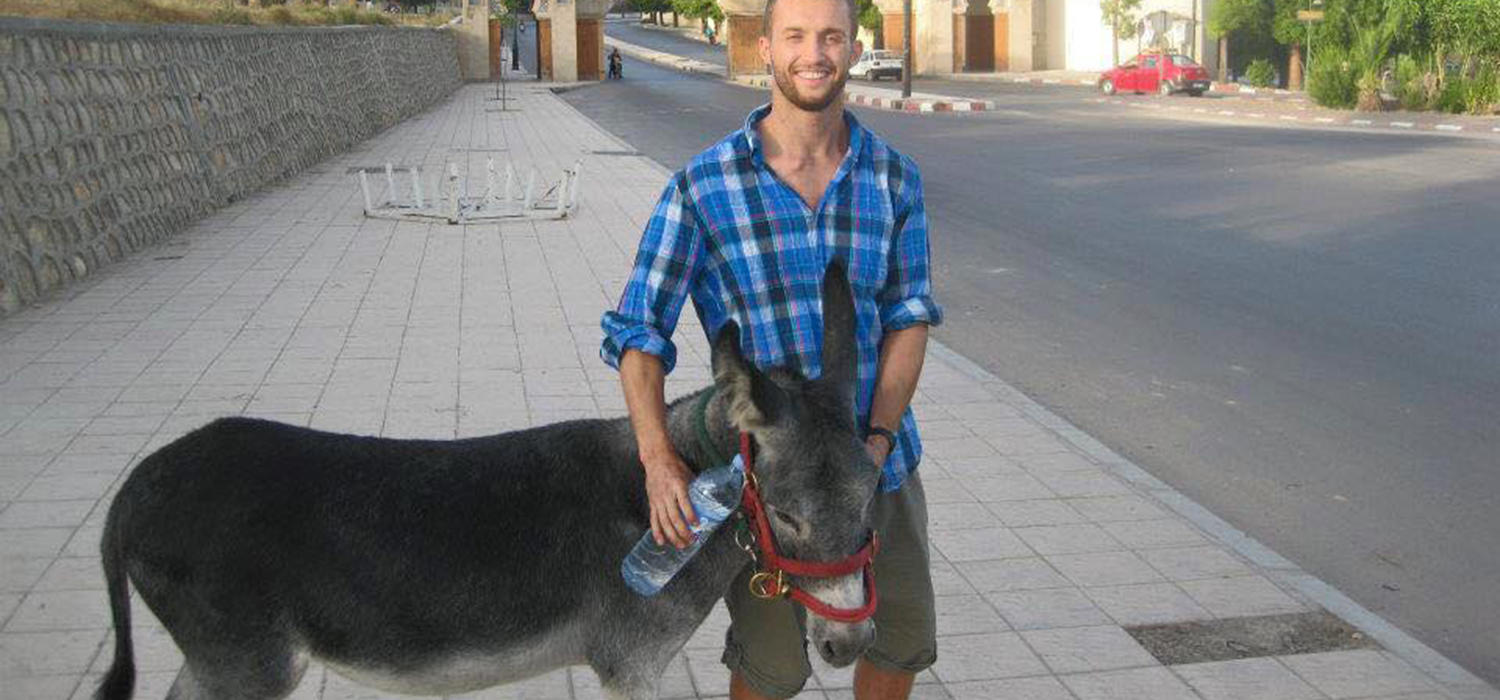
Dr. Scott Zaari’s LinkedIn page identifies him as the chief veterinary officer with Manitoba Agriculture’s Animal Health and Welfare branch — an impressive job title considering the 38-year-old received his DVM from the University of Calgary’s Faculty of Veterinary Medicine (UCVM) less than a decade ago. Spend a few minutes with this 2013 grad, however, and you’ll leave dazzled by his volunteer and work stints in far-flung spots, from Bangkok and New York City, to Paris and Myanmar.
From his international role evaluating veterinary services across Southeast Asia, to running a personal fundraiser in Myanmar for albino elephants, Zaari’s appetite to see the world began at UCalgary when he discovered “the very unique volunteer opportunities that you can have both as a vet student and as a veterinarian."
His first volunteer opportunity was a summer gig at a charitable veterinary organization for working animals in Fez, Morocco. “And now, as I reflect on my current volunteer mentorship work that I do with two students at UCVM, I feel compelled to give back ... just as faculty do, who give so much of their time and energy to emerging veterinarians,” Zaari says.
“My contribution is but a very small gesture compared to our faculty. Also, I think most vet students do not understand that UCalgary’s veterinary faculty is largely government and/or publicly supported and our tuition amount is only a drop in the bucket compared to the total cost of educating a veterinary student. And so, to some extent, I feel obligated to fellow Canadian taxpayers to give back through volunteering whenever possible.”
Q: What is your current volunteer role with the two students at UCVM?
A: We connect and brainstorm about different career options outside of private practice and, more recently, some different graduate course options for them. It’s been a great opportunity to do some brainstorming around choices, to help with their understanding of what it means to be a non-clinical vet. I try to pass on that knowledge, the good, the bad and ugly to the students as I know it, having only graduated eight years ago.
Q: What do you mean by a non-clinical setting?
A: Many people in society are unaware of the role that vets can play outside of clinical practice like I do. Let’s pretend I am at a party and I tell someone I am a government vet. That person will still likely want me to give them feedback on insulin doses for their cat. That’s when I have to explain that “I’m not the best vet for that advice, but I can chat with you about other issues such as the impact of COVID-19 exposure in cats and dogs and other species, like mink, around the world.” And I could speak to that, or to things like the outbreak response of infectious laryngeal tracheitis in poultry flocks and also about how African Swine Fever virus has devastated global swine populations and spread across Asia into Europe, and why we’re all concerned about this now in North America ...
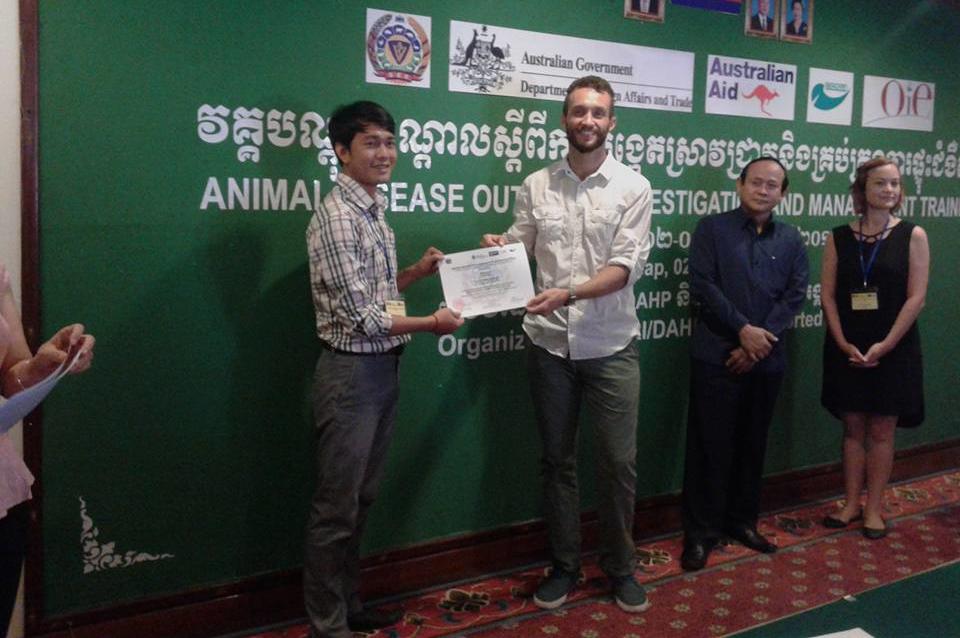
Zaari in one of the many workshops he coordinated across South-East Asia in his role as project officer for the OIE. This particular workshop focused on Reportable Disease Outbreak Investigation for government veterinarians in Siem Reap, Cambodia.
Q: What role do you feel volunteers play in society?
A: Equally important to the act of volunteering is how you espouse these values at an individual level on a day-to-day basis in our local and global communities. I think volunteers play a more consistent and permanent role in terms of how we function as a society than we likely know and I believe they provide a huge contribution to the world. Volunteering is less about one experience and more about how you live your life and the “volunteerism” values that you espouse on a daily basis.
Q: Reflecting back on your time as a student, what was your favourite hangout on campus?
A: Sadly, I don’t think I had a favourite hangout, but that maybe suggests a wider reminder to myself and fellow students — that you need to expand your horizons beyond the classroom. I was obsessed with passing and getting my DVM, and that really overshadowed much of my experience as it did with some of my classmates as well. That’s not to say I didn’t have a good time, but I think a trap that many students fall into today is the intense focus on grades. This can really impact the mental capacity and energy to do things outside of the classroom, which is also a major part of an educational experience.
That said, my favourite group activity was indoor recreational soccer. I was a regular member of UCalgary's indoor soccer league and we had a vet team that hopefully still exists, so that was an important stress-reliever for me.

Zaari and his team is collaborating with local female artists from Myanmar and Thailand to extend the street art activism through Pyti Tine Htaung dolls with outdoor displays coming to Winnipeg this summer.
Q: If you didn’t have to earn a paycheque for six months, what volunteer work would you do?
A: I would centre my efforts not internationally, which I’m familiar with at a volunteer level, but I’d focus on how I could contribute here, in Canada. I think we need to better support our rural and remote communities, including our Indigenous communities in Canada and provide improved access to veterinary services.

